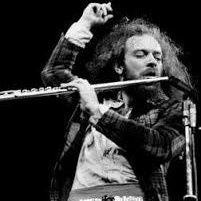Ian Anderson born on August, 10, 1947 in Dunfermline, Fife, Scotland, is the most famous and innovative flute-player of last 40 year. Anderson also it has got out of a jam itself like singer, composer, and multi instrumentalist, that include acoustic and electrical guitars, saxophone, organ, drum, keyboards, bagpipe, violin, balalaika, clarinet, and great variety of whistles. He is the lider and creator of the rock band Jethro Tull. As flute-player, Anderson is self-taught and his style there was inspired for other recognized flute-player, Rahsaan Roland Kirk. In 1963 he formed The Blades with his companions of studies Barriemore Barlow (drum), John Evan (keyboards), Jeffrey Hammond Hammond (bass guitar) and Michael Stephens (guitar). The Blades was a band of soul and blues, with Anderson like singer and harmonica player. In 1965 the group turned into The John Evan Band with a major formation. It dissolved two years after when Anderson had to move to Luton. In his new city of residence, Ian knew the drumer Clive Bunker and the guitarist Mick Abrahams, proceeding from McGregor's Engine. With Glenn Cornick, a bassist - known of John Evan-, Anderson created the seed of the group that would be a legend, Jethro Tull. Later, the band suffered big changes between his members. The most important was the incorporation of Martin Lancelot Barre (guitar), the only musician that it remains in the band after more than four decades of history, who replace Mike Abrahams in 1969. Also they were outlined Mark Craney (drumer), David Palmer (orquestador and adjustor) and Eddie Jobson (keyboards and violin, ex-UK) As flute-player, Anderson is self-taught. His style is based in large fluttertonguing (frulato), and occasionally canticles and rare sounds while it touches. Besides his profession like musician, Anderson is an owner of many farms of salmon, great part of them in Chile, south America. Like singer has survived a dangerous thrombosis suffered after a flight in airplane. Equally, his voice has met suffered in the last years by different problems in the throat. The style of Ian Anderson mixes folk, celtic music, jazz, rock, blues and pop, and his letters are complex, acid and critiques about the society and religion.
show less


Comments